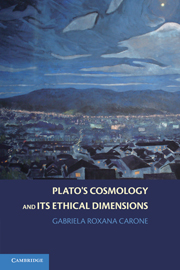Book contents
- Frontmatter
- Contents
- Preface
- Plato's Cosmology and Its Ethical Dimensions
- 1 Introduction
- 2 Demiurgy in the Timaeus
- 3 Cosmic God and Human Reason in the Timaeus
- 4 Creating Mixtures in the Philebus
- 5 Happiness in the Universe of the Philebus
- 6 Reversing the Myth of the Politicus
- 7 Cosmic and Human Drama in the Politicus
- 8 Laws X: First Causes and the Origin of Evil
- 9 Conclusion
- Notes
- Bibliographical References
- Index Locorum
- General Index
4 - Creating Mixtures in the Philebus
Published online by Cambridge University Press: 10 May 2010
- Frontmatter
- Contents
- Preface
- Plato's Cosmology and Its Ethical Dimensions
- 1 Introduction
- 2 Demiurgy in the Timaeus
- 3 Cosmic God and Human Reason in the Timaeus
- 4 Creating Mixtures in the Philebus
- 5 Happiness in the Universe of the Philebus
- 6 Reversing the Myth of the Politicus
- 7 Cosmic and Human Drama in the Politicus
- 8 Laws X: First Causes and the Origin of Evil
- 9 Conclusion
- Notes
- Bibliographical References
- Index Locorum
- General Index
Summary
The Philebus is known as a dialogue on pleasure. Its central issue is “the good”, or happiness, for humans, and where it is to be found. Is it in pleasure, knowledge, or a mixture of both? At the outset of the dialogue, Philebus and Protarchus are presented as two supporters of hedonism, advocating the first view. Socrates appears, at least initially, defending the second one, even though they agree that if a life is found that is superior to both, that candidate wins (11d–12a). The question will then concern the status of a mixed life of pleasure and knowledge with respect to happiness, and what the role of those components is within it.
Now, if this is so, and if the purpose of the dialogue is fundamentally ethical, it might seem prima facie surprising that so much of it is spent on taxonomy, or dialectical classifications of kinds of pleasure and knowledge. In particular, it might seem disturbing that the interlocutors should devote a whole section (14–31) to dealing with a pair of notions that stand out as especially obscure in Plato's writing. These are those of limit (to peras) and the unlimited or indefinite (to apeiron), whose interpretation has raised unending controversy. As we shall see, they are introduced not as mere technicalities, but with the hope of shedding light on difficult logical (or dialectical) and metaphysical issues. But why should dialectic and metaphysics matter to a hedonist?
- Type
- Chapter
- Information
- Plato's Cosmology and its Ethical Dimensions , pp. 79 - 102Publisher: Cambridge University PressPrint publication year: 2005

